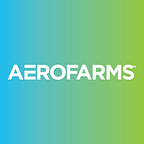Seventy percent of global water resources go toward agriculture. Seventy percent of fresh water contamination comes from agriculture. Sit with that a moment.
This incredible statistic is what drove David Rosenberg, Chief Executive Officer of AeroFarms to co-found the pioneering vertical farming company. He wanted to do something about the very real possibility that his children would not be able to take clean water for granted as most of us do today.
He soon learned that salad is a good place to start. The US packaged salad industry will grow to $7 billion by 2018 and 95% of those greens grow in either the Salinas Valley in California or Yuma, Arizona. The quantity of water required to sustain these farms, not to mention the intense water requirements of the controversial “triple washing” practice, has largely contributed to the dire state of water in California, magnified — though not begun — by years of drought.
Satellite images from November show that reservoirs and lakes in California had lost almost half of their capacity. And though reportedly, Governor Jerry Brown is preparing to declare the drought over next month, meteorologists and climate scientists say the volatility is here to stay. This challenges the efficacy of California’s water infrastructure, which is heavily dependent on snow not melting in sudden, early spring.
Plus, water quantity isn’t the only issue — contamination is on the rise. The California Water Board recently sent a letter to 19 growers in Salinas Valley requesting that they provide clean water to communities with nitrates (a result of pesticide use) in their wells or be ordered to pay for the necessary filtration to make the well-water potable.
These trends may be just hitting the news in recent years, but they have been around for decades. While serving on the World Economic Forum Global Water Task Force, David became aware of the troubling direction industrial agriculture was taking us and he concluded that it was agriculture that had to change. When he learned of the unique aeroponic growing system invented by Dr. Ed Harwood, formerly of the Cornell University School of Agriculture, he found the solution he had been looking for that could scale to feed the masses.
There is no more water-efficient system of growing baby leafy greens than the AeroFarms aeroponic system. It uses 95% less water than field farming and 40 percent less than hydroponic systems. We achieve this by misting the plant’s roots with water.
AeroFarms technology is a closed loop system, recycling water and nutrients with virtually zero waste. That means no soil contamination, no toxic runoff, and no well contamination.
Our leaves don’t require triple washing, or any washing because they never come in contact with the nutrient mist below.
The reason we do what we do starts here. It starts with the hope that we can reverse years of reckless disregard for the health of our water table and the fallacy that water is forever.
We’ve started here at home, but if you’ve read this far, you probably can name a few more countries that could use a water-efficient system of agriculture that doesn’t contribute to pollution. With farms in the works on four continents, we may already be on our way.
Read more about the way we grow at www.aerofarms.com and keep up with our work on twitter, instagram and facebook. We have lots of big news on the horizon and many more stories to share.
